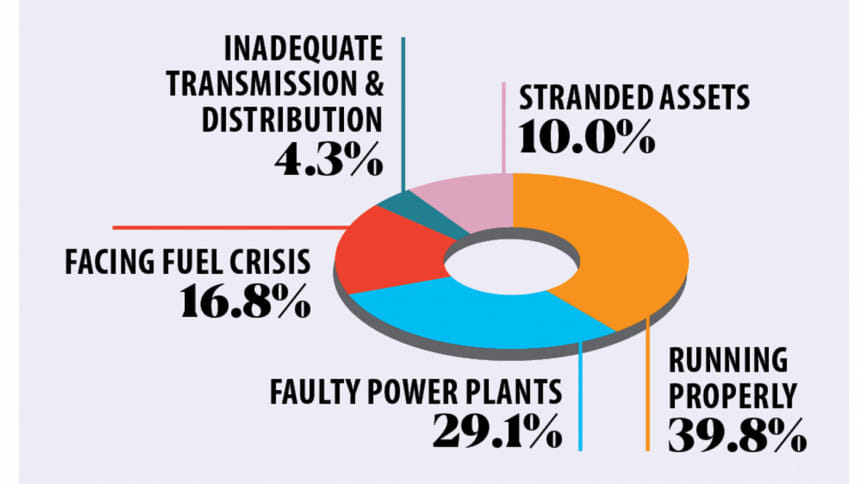Power plants riddled with myriad problems

None of the fossil fuel-based power plants ran properly for more than 38 percent of the time in the 2021-22 fiscal year, said a study.
A third of the power plants were faulty, 18 percent suffered from mechanical problems, eight percent had to undergo maintenance, and the rest were shut down, it added.
One-third of the heavy fuel oil-based power plants did not run properly, and throughout the year, those plants ran below 10 percent of the time, it said.
The study was presented by Coastal Livelihood and Environmental Action Network (CLEAN) at Bangladesh Energy Prosperity 2050 conference in the capital yesterday.
CLEAN cited Bangladesh Power Development Board website as the source of the data.
However, the solar power plants ran without problems for 97.8 percent of the time.
About 16.8 percent of the fossil-fuel based power plants suffered from fuel shortage.
Sarmin Akter Bristy, research officer at CLEAN, said even the power plants that had mechanical problems almost the entire time were considered to be "in operation" by the Bangladesh Power Development Board.
About 10 percent of the power plants were classified by the researchers as stranded assets, either not being used due to low demand, or because they were kept on reserve on the merit order dispatch list.
Six high-speed diesel-based (HSD) privately owned independent power plants were kept on reserve for more than 75 percent of the time during the last fiscal year.
The HSD power plants also remained down for 21.1 percent of the time last year.
In addition, four of the 20 quick rental and rental power plants were kept on reserve more than 60 percent time of the year
However, the power plants kept on reserve could not produce when they were asked to, observed the researchers.
Out of the 43 state-owned power plants, as many 22 sat idle for more than half the time. On the other hand, nine out of 23 publicly owned independent power plants suffered fuel crises for approximately 40 percent of the time.
Meanwhile, Kaptai dam suffered from low water levels every single day last year, said Bristy.
Coal power plants had the most mechanical problems, facing issues 41 percent of the time.
There were 10 gas-fired power plants that had problems 90 percent of the time.
Shahriar Ahmed Chowdhury, managing director of Solis Power and Energy, pointed out that the less a power plant is utilised, the higher the cost gets to operate it.
"We are running liquid fuel-based power plants to produce electricity for the base load instead of peak load," said Chowdhury, who also leads the Centre for Energy Research at United International University.
The base load is the minimum electricity demanded by the nation while the peak load is the amount needed during times of highest demand.
"Only if we replaced liquid fuel-based power plants during the day time with solar, we could have saved $ 322.15 million every year. Liquid fuel power plants must be stopped immediately. It will be cheaper to use gas-run peaking power plants," he added.
Peaking power plants are the ones which are known to produce "expensive" electricity, but even that would be cheaper, he said.
The conference, held at Bangabandhu Military Museum, is the joint effort of Bangladesh Working Group on External Debt, Climate Parliament Bangladesh, The Earth Society, ActionAid Bangladesh, Bright Green Energy Foundation (BGEF), CLEAN, Center for Participatory Research and Development (CPRD), Centre for Policy Dialogue (CPD), Change Initiative, Participatory Research and Action Network (PRAAN), Solis Power and Energy Limited (SPEL) and Waterkeepers Bangladesh.

 For all latest news, follow The Daily Star's Google News channel.
For all latest news, follow The Daily Star's Google News channel. 



Comments